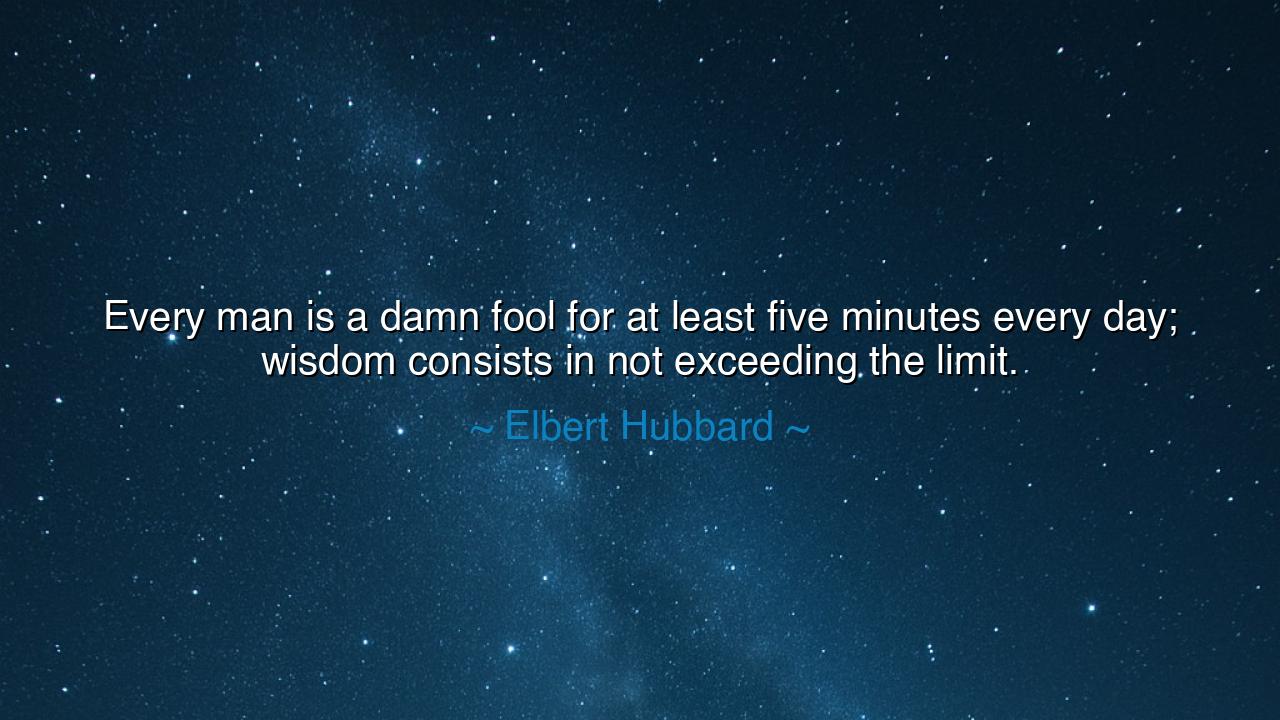
Every man is a damn fool for at least five minutes every day;
Every man is a damn fool for at least five minutes every day; wisdom consists in not exceeding the limit.






Hear me, O children of wisdom, for the words of Elbert Hubbard carry a timeless truth: "Every man is a damn fool for at least five minutes every day; wisdom consists in not exceeding the limit." These words remind us of the nature of human folly, the fleeting moments when our judgment falters, and our minds drift into impulsiveness. To be human is to be susceptible to error, to make choices that, in hindsight, seem absurd. Yet, true wisdom lies not in avoiding these moments of foolishness, but in knowing their limits, in recognizing when we have strayed and swiftly returning to the path of clarity.
Folly is a part of every man, a shadow that lingers in our hearts, waiting for the moments when we are least prepared. Yet, as Hubbard so rightly points out, the true measure of our character is not in avoiding these fleeting lapses, but in knowing how to control them. To recognize the moments when we act in haste, when our emotions cloud our reason, and to steer ourselves back on course—that is the wisdom that will lead us through the trials of life. It is not the absence of folly, but the awareness of it that separates the wise from the foolish.
Consider the example of King Solomon, renowned for his wisdom, who was not immune to folly in his youth. In his early reign, Solomon made choices that were rash, driven by his youthful impulses. Yet, as he grew in wisdom, he learned the value of reflection, of taking a step back before acting. His Proverbs teach us that while we may stumble, true wisdom comes when we recognize our faults and learn from them, thus ensuring that folly does not take hold of us for too long.
In the same vein, Socrates, the great philosopher, often spoke of the need for self-examination. Though revered for his intellectual rigor, he too understood the limits of human reason. Socrates knew that the wise man is not one who never errs, but one who learns to recognize his errors and correct them. His life was marked not by an absence of folly, but by the discipline to return to reason when the flames of foolishness threatened to take over.
Thus, my children, remember this ancient wisdom: folly is a natural part of the human condition, but wisdom is found in the ability to recognize it, to see the fleeting moments of foolishness for what they are, and not to be swept away by them. In every moment, you will face the temptation to act in haste, to give in to your emotions, but the wise man knows when to step back, when to pause, and when to seek a clearer path. Let your wisdom not be defined by a life without error, but by a life where error is met with awareness, reflection, and growth. In this, you will find the strength to navigate the world with clarity and purpose.






DTDuc Trung
Thinking about leadership, the idea hits differently: a manager’s brief lapse can ripple across budgets, culture, and trust. What structures should leaders build to contain and learn from missteps—red-teaming, blameless postmortems, error budgets, and public decision logs? Also, when does transparency heal, and when does it erode confidence? Please weigh in on designing feedback loops that keep experimentation alive while protecting stakeholders, especially in high-stakes settings like aviation, medicine, or cybersecurity. What’s your rule of thumb for broadcasting versus buffering a mistake?
UGUser Google
Emotionally, this line feels like permission to breathe. Perfectionism makes me catastrophize small slips; reframing them as routine lowers anxiety and imposter syndrome. My concern: does naming a ceiling encourage secret shame when we inevitably overshoot? I’d appreciate guidance on self-compassion practices that still maintain standards—journaling micro-failures, sharing them in psychologically safe retros, and celebrating course corrections. How do you communicate this mindset to high achievers so it fuels curiosity and accountability rather than complacency or avoidance?
MTNguyen Minh Thu
There’s a philosophical elegance here: humility as a guardrail. It echoes Socratic awareness and metacognition—knowing when your map drifts from the territory. Question: is wisdom less about flawless judgment and more about rapid error detection plus graceful recovery? How might we cultivate that in students and citizens—teach cognitive biases early, practice adversarial thinking, and run steelman drills? I’m eager for a nuanced view linking intellectual humility to resilience without drifting into cynicism or lowering standards.
DNDh Nguyet
If I read this as practical advice, it sounds like risk management for cognition. What routines actually keep misjudgments short-lived? I’m experimenting with delay-to-send on emails, premortems before big choices, mandatory cool-down walks, and a two-person rule for irreversible actions. Do you use timers, checklists, or rubber-ducking to bound impulsive decisions? Please share a concise playbook for teams that treats errors as data, accelerates feedback loops, and converts near-misses into improvements without shaming people into silence.
MNMini nguyen
Part of me bristles because not everyone pays the same price for mistakes. Marginalized colleagues or junior staff often face harsher consequences than insulated insiders. Does the sentiment unintentionally reflect privilege—wisdom as cushion to keep errors hidden or harmless? Closed question: do you agree accountability should scale with power, so leaders carry tighter guardrails and clearer consequences than frontline workers? I’m looking for a concrete framework that mixes compassion with equity: restorative practices for minor harms, but proportionate responsibility when decisions affect many.